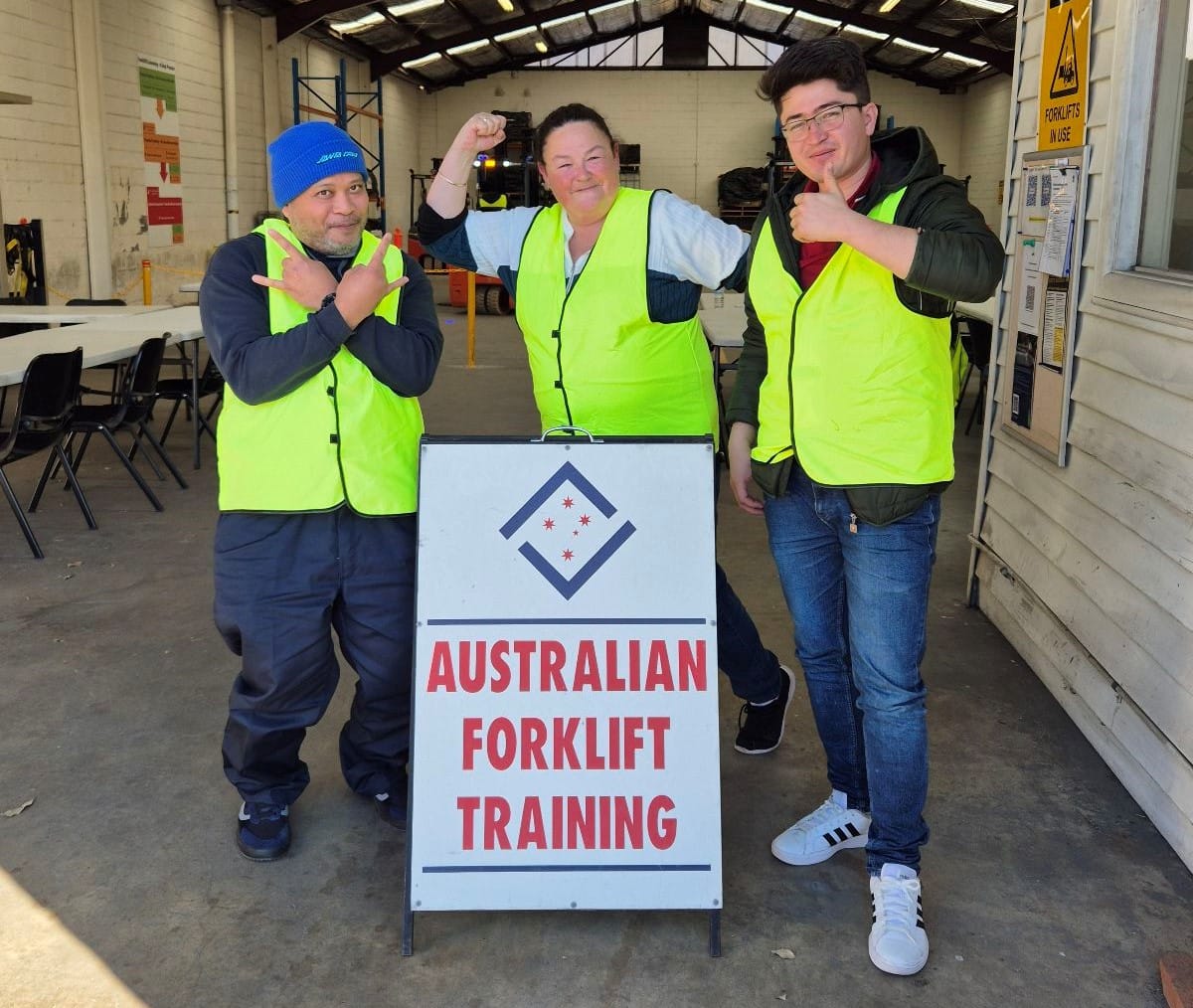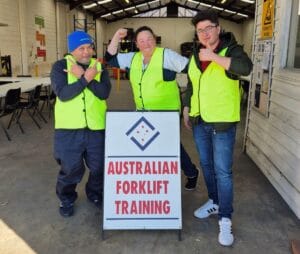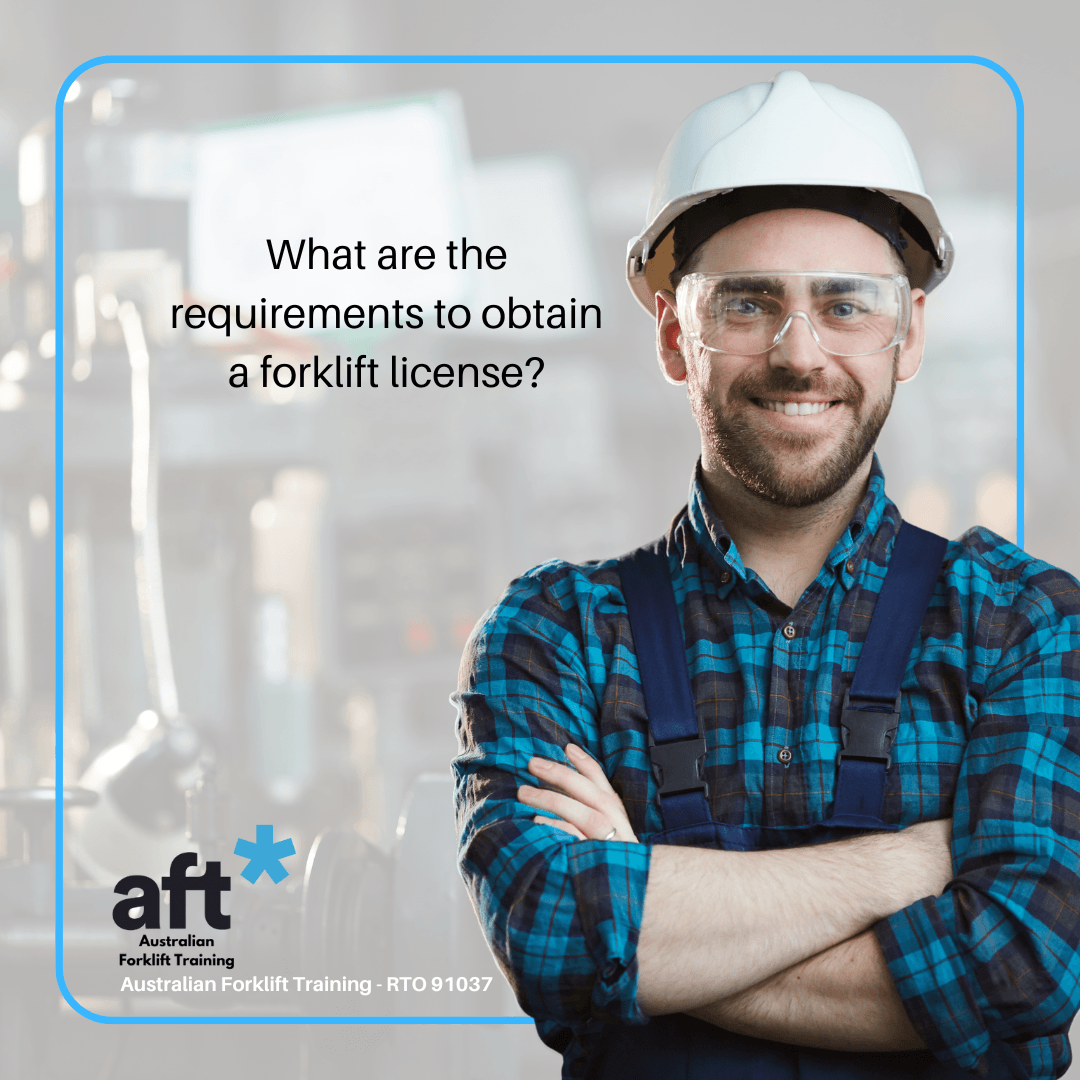
Is a Forklift License Worth It?
Is a Forklift License Worth It? The Complete Guide to Career Benefits in 2025
If you’re wondering whether investing in forklift training is worth your time and money, the numbers speak for themselves. Is a Forklift License Worth It? 100% yes!
Licensed forklift operators earn AUD 10,000 to AUD 20,000 more annually than their unlicensed counterparts, gain access to 85% more job opportunities in warehousing and logistics, and typically recover their training investment within 2-3 months of employment.
The short answer to “is a forklift license worth it” is an emphatic yes. But let’s dive deeper into the financial benefits, career prospects, and long-term value of obtaining forklift certification to help you make an informed decision about this career investment.
Book your forklift training at our Blacktown or Moorebank centre

The Short Answer: Yes, a Forklift License is Absolutely Worth It
A forklift license, formally known as forklift operator certification, represents far more than just a piece of paper. It’s your legal authorisation to operate powered industrial trucks and your ticket to accessing a robust job market across multiple industries.
Here’s why the investment makes immediate financial sense:
- Salary Premium: Licensed forklift operators consistently earn AUD 10,000–AUD 20,000 more annually than general warehouse workers
- Job Market Access: Certification opens doors to 85% more employment opportunities in logistics and warehousing
- Quick ROI: Most operators recover their training costs within 2-3 months of employment
- Legal Requirement: Forklift operation without proper certification can result in hefty fines exceeding AUD 10,000 for employers
- Essential Worker Status: Forklift operators are classified as essential workers, providing recession-resistant job security
The forklift certification process isn’t just about learning to operate a forklift safely—it’s about positioning yourself in a growing industry where skilled operators are in constant demand.
Book your forklift training at our Blacktown or Moorebank centre
Financial Benefits: The Numbers That Matter
Let’s examine the concrete financial advantages that make forklift training such a smart investment.
Salary Comparison: Licensed vs Unlicensed Workers
The earning potential between certified forklift operators and general warehouse workers shows a significant gap that justifies the training investment, so let’s consider, Is a Forklift License Worth It?
In Sydney specifically, licensed operators command impressive hourly rates between AUD 25 and AUD 45, translating to annual salaries ranging from AUD 52,000 to AUD 93,600. When overtime opportunities are factored in—often paying AUD 50+ per hour—annual compensation can approach or exceed AUD 90,000 in prosperous markets.
Return on Investment Analysis
The math on forklift license ROI is compelling. Training courses typically cost between AUD 300–AUD 700, while the salary differential means you’ll recover this investment remarkably quickly:
Example ROI Calculation:
- Training cost: AUD 700 (comprehensive dual-license program)
- Salary increase: AUD 15,000 annually (conservative estimate)
- Recovery time: 17 days of work
- 3-year additional income: AUD 45,000
Even with a basic AUD 300 certification, the payback period is measured in weeks, not months. Over a typical career span, this translates to hundreds of thousands in additional lifetime earnings. Is a Forklift License Worth It? Yes!
Career Advancement Opportunities
Forklift certification serves as a foundation for broader career prospects within logistics, warehousing, and manufacturing sectors. The skills and knowledge gained through proper training open pathways that extend far beyond basic forklift operation.
Progression Pathways for Certified Operators
Entry-level certified forklift operators frequently advance to supervisory roles, team leadership positions, or warehouse management after gaining experience. Many companies actively promote top-performing operators to safety training roles or compliance specialist positions, recognizing their hands-on expertise and commitment to workplace safety.
The career progression typically follows this pattern:
- Entry-level Operator → Equipment specialist across different forklift types
- Senior Operator → Team lead or shift supervisor
- Supervisor → Warehouse manager or operations coordinator
- Management → Training specialist or safety compliance officer
Skill Stacking for Enhanced Opportunities
Combining forklift certification with additional qualifications significantly increases both job security and career flexibility. Operators who obtain multiple equipment licenses, pursue logistics management training, or develop inventory control skills become invaluable assets to employers.
Entrepreneurial opportunities also emerge for certified operators. Many leverage their expertise to start courier services, logistics consulting businesses, or warehousing operations, using their practical knowledge as a competitive foundation.
The versatility of forklift skills means certified operators can transition between construction sites, manufacturing facilities, distribution centers, and retail operations without additional training—a level of career mobility that few other certifications provide. Is a Forklift License Worth It? Yes!
How long does it take to get a forklift licence in NSW?
Job Market Demand and Security
The logistics sector continues experiencing unprecedented growth, driven primarily by e-commerce expansion and evolving supply chain requirements. This growth translates directly into sustained demand for qualified forklift operators across multiple industries.
Industry Growth Driving Demand
E-commerce growth is projected to increase at a 15% compound annual growth rate, creating ripple effects throughout warehouse operations and distribution networks. This expansion requires skilled operators who can safely handle the increased volume and complexity of modern logistics operations.
The essential worker classification provides additional job security. During economic uncertainties, logistics and warehousing operations continue functioning to maintain supply chains, making certified operators less vulnerable to layoffs compared to workers in other sectors.
Geographic and Industry Flexibility
Forklift operating skills are highly transferable across locations and industries. Whether you’re in Sydney, Melbourne, Brisbane, or Perth, certified operators find consistent demand. The skills learned in one warehouse environment translate seamlessly to construction sites, manufacturing plants, or retail distribution centers. Is a Forklift License Worth It? Sure is!
Current job market data shows hundreds of openings across major Australian cities at any given time, with particularly strong demand in:
- E-commerce fulfillment centers
- Construction and infrastructure projects
- Manufacturing and production facilities
- Port and shipping operations
- Retail distribution networks
The aging workforce in logistics creates additional replacement opportunities as experienced operators retire, while new infrastructure projects continue emerging in both metropolitan and regional areas.
Safety and Legal Compliance Benefits
Beyond the financial advantages, forklift certification provides crucial legal protection and safety benefits that protect both operators and employers.
Legal Requirements and Compliance
Operating a forklift without proper certification isn’t just risky—it’s illegal in most jurisdictions. Employers face penalties exceeding AUD 10,000 for each instance of unlicensed forklift operation, and insurance policies can be voided if operators lack proper certification.
The legal obligation extends to ensuring workplace safety through comprehensive training. WHS regulations and similar guidelines in other countries mandate that operators complete certified training programs before operating powered industrial trucks.
Can I Teach Someone to Drive a Forklift Myself?
Workplace Safety and Insurance Benefits
Proper training significantly reduces workplace accidents. In 2020, over 7,290 forklift-related injuries occurred in the US alone, many involving untrained operators. Certified operators understand safety protocols, equipment limitations, and emergency procedures that prevent accidents and protect lives.
Insurance providers often offer premium reductions to companies hiring only certified operators, recognizing that trained operators result in fewer claims and lower accident rates. For individual operators, certification provides personal liability protection and may enhance workers’ compensation coverage in case of workplace incidents.
Types of Forklift Licenses: LF vs LO
Understanding the different license categories helps you make informed decisions about which certification best matches your career goals and local job market demands.
LF License: Standard Operations
The LF licence covers operation of standard counterbalance forklifts, reach trucks, and other general-purpose equipment. This certification is essential for traditional warehousing, manufacturing, and construction applications where operators handle palletized goods and standard loads.
LF-licensed operators work primarily at ground level, loading and unloading trucks, moving inventory within warehouses, and supporting production lines. The training covers equipment inspection, load handling, safety measures, and operational procedures for these conventional applications.
LO License: Elevated Operations
The LO license is required for order-picking forklift truck operation and stock pickers where operators elevate with the load. This certification involves additional safety training due to the increased risks associated with working at varying heights.
LO-licensed operators are essential in high-bay warehouses, distribution centers, and facilities utilizing vertical storage systems. They pick individual items from shelves, work in narrow aisles, and handle stock in tight spaces that require precision and specialized skills.
Which License Should You Choose?
The choice between LF and LO certification depends largely on your local job market and career objectives:
Choose LF if you’re targeting:
- Construction sites and building projects
- Manufacturing facilities and production environments
- Traditional warehousing with ground-level operations
- Heavy machinery and equipment operations
Choose LO if you’re focusing on:
- E-commerce fulfillment centers
- High-bay distribution facilities
- Retail distribution networks
- Modern automated warehouse operations
Many employers prefer dual-licensed operators for their versatility and ability to cover different operational needs. While obtaining both licenses requires additional time and investment, it significantly expands job opportunities and can command premium wages in competitive markets.
What Is the Difference Between LF and LO Forklift Licence?
Training Investment: Cost vs Value
Understanding the true cost of forklift training helps you evaluate the investment against long-term career benefits and earning potential.
Training Program Costs and Options
Forklift training courses typically range from AUD 300 for basic certification to AUD 700 for comprehensive dual-license programs. The investment includes:
- Classroom instruction covering safety protocols and regulations
- Practical exercises with various forklift types
- Written exam and practical driving test
- Certification documentation and license processing
- Safety equipment and training materials
Many registered training organisations offer flexible scheduling, including weekend and evening classes to accommodate working professionals. Some employers subsidize or fully fund certification for new hires or existing staff seeking advancement.
Government Incentives and Employer Support
Government programs occasionally provide subsidies or incentives to boost the certified workforce, particularly in regions experiencing skills shortages. These programs can significantly reduce out-of-pocket training expenses.
Employer-funded training represents another cost-reduction opportunity. Many companies invest in forklift training certification for employees as part of workforce development initiatives, recognizing the immediate operational benefits and reduced liability.
Online vs In-Person Training Considerations
While online training modules are available for theoretical components, practical training and testing must occur in person to meet regulatory standards. In-person training programs typically achieve higher pass rates and provide essential skills that can’t be replicated virtually.
The hands on forklift training component ensures operators understand equipment-specific controls, develop spatial awareness for safe operation, and practice emergency procedures in controlled environments.
Work Flexibility and Lifestyle Benefits
Forklift certification opens doors to diverse employment arrangements that accommodate different lifestyle preferences and work-life balance needs.
Shift Options and Scheduling Flexibility
Certified operators can choose from various shift patterns including day, afternoon, night, and weekend schedules. This flexibility proves valuable for:
- Parents coordinating childcare responsibilities
- Students balancing work and education
- Workers seeking supplementary income through part-time roles
- Individuals preferring non-traditional work hours
Employment Arrangement Variety
The job market offers full-time permanent positions, part-time roles, casual employment, and temporary contracts. Many operators leverage this flexibility to:
- Supplement primary income through weekend work
- Test different employers before committing to permanent roles
- Maintain work-life balance through reduced hour arrangements
- Gain experience across multiple industry sectors
Geographic Mobility
Forklift skills transfer seamlessly across regions and even internationally with appropriate license conversion. This mobility enables operators to:
- Relocate for family or lifestyle reasons without career disruption
- Follow construction projects or seasonal employment opportunities
- Explore opportunities in different markets or industries
- Maintain employment during economic shifts in specific regions
Industry Growth and Future Prospects
The long-term outlook for certified forklift operators remains strongly positive, supported by fundamental economic trends and technological developments.
Technology Integration and Operator Roles
Despite advancing warehouse automation, human operators remain essential for complex tasks, equipment maintenance, and oversight of automated systems. Emerging technologies like telematics and automated guided vehicles increasingly require skilled operators with technical literacy.
Modern warehouses integrate human expertise with technological solutions, creating hybrid roles that combine traditional forklift operating skills with technology management capabilities. Operators who embrace these technological advances position themselves for enhanced career prospects and premium compensation.
Infrastructure Development and Market Expansion
Major infrastructure projects continue across developed economies, driving demand for skilled equipment operators. Supply chain modernization, port expansions, and distribution network upgrades all require experienced forklift operators to support construction and ongoing operations.
The logistics sector’s essential role in economic functioning provides stability even during economic downturns. While hiring may slow during recessions, the fundamental need for goods movement and warehouse operations maintains baseline demand for certified operators.
Long-term Career Sustainability
Industry forecasts suggest stable or increasing job openings over the next decade, with operators who continuously upgrade their skills best positioned for ongoing success. The combination of:
- Essential worker classification
- Aging workforce creating replacement needs
- Continued e-commerce growth
- Infrastructure investment
Creates a favorable employment environment for certified operators willing to maintain current certifications and adapt to evolving workplace technologies.
Potential Drawbacks and Considerations
While forklift certification offers substantial benefits, understanding potential challenges helps set realistic expectations and prepare for career success.
Physical Demands and Work Environment
Forklift operation involves physical demands including repetitive motions, extended sitting periods, and potential exposure to weather conditions in some work environments. The role requires sustained attention and precise motor control, which can be fatiguing over long shifts.
Workplace environments may include:
- Noisy industrial settings
- Temperature extremes in unheated warehouses
- Dust and fumes in certain applications
- Shift work affecting sleep patterns
License Maintenance Requirements
Forklift licenses require renewal every five years in Australia, with some jurisdictions mandating refresher courses or retesting. Maintaining current certification requires ongoing investment in training and staying up to date with evolving safety regulations.
Operators must also complete regular equipment inspections and maintain awareness of changing workplace safety requirements as technology and regulations evolve.
Competition and Market Factors
Experienced operators with additional qualifications may have competitive advantages in tight job markets. Entry-level license holders might face competition from candidates holding multiple certifications or extensive experience across different forklift types.
Economic downturns can affect hiring rates, though the essential nature of logistics operations provides relative stability compared to other sectors. Automation continues advancing, potentially affecting some routine positions over longer time horizons.
Getting Started: Your Action Plan
Taking the crucial step toward forklift certification requires understanding the process, selecting appropriate training, and positioning yourself for employment success.
Eligibility and Prerequisites
Before beginning forklift training, ensure you meet basic requirements:
- Minimum age of 18 years
- Basic English language proficiency for safety instruction
- Physical capability to safely operate heavy machinery
- No disqualifying medical conditions affecting vision or motor control
Selecting Training Providers
Choose accredited training providers that offer:
- Comprehensive training covering both theoretical knowledge and practical exercises
- Modern equipment representing current industry standards
- Experienced instructors with relevant industry backgrounds
- Support for job placement or employer connections
- Flexible scheduling to accommodate your availability
Research local registered training organisations and compare their offerings, success rates, and graduate employment outcomes. Many providers offer information sessions or facility tours to help you evaluate their programs.
Certification Process Steps
The complete certification process typically involves:
- Course Selection: Choose between LF, LO, or dual-license training based on career goals
- Enrollment: Register with your chosen training provider and complete required paperwork
- Classroom Instruction: Complete theoretical training covering safety protocols, regulations, and equipment knowledge
- Practical Training: Develop hands-on forklift training skills through supervised operation
- Testing: Pass both written exam and practical driving test demonstrating competency
- Documentation: Submit certification paperwork to relevant regulatory authorities
- Job Search: Begin applying for positions requiring forklift certification
Employment Search Strategies
Effective job search approaches for newly certified operators include:
Target High-Demand Employers:
- Large logistics companies and distribution centers
- Construction firms and infrastructure projects
- Manufacturing plants and production facilities
- Port operations and shipping companies
- Employment agencies specializing in industrial staffing
Leverage Training Connections: Many employers recruit directly from training programs, recognizing that recent graduates possess current knowledge and proper safety training. Maintain connections with instructors and classmates who may provide job leads or references.
Highlight Certification in Applications: Emphasize your recent certification, commitment to workplace safety, and willingness to work various shifts. Entry-level positions often value attitude and reliability over extensive experience.
Book your forklift training at our Blacktown or Moorebank centre
Conclusion: Making the Investment Decision
The evidence overwhelmingly supports forklift certification as a worthwhile career investment. With training costs recoverable within weeks of employment, immediate access to higher wages, and pathways to long-term career advancement, few professional certifications offer comparable return on investment.
Licensed forklift operators enjoy job security in essential industries, geographic mobility, and flexibility in work arrangements that accommodate diverse lifestyle needs. The legal requirements for certification mean unlicensed operation simply isn’t an option in professional environments.
Whether you’re entering the workforce, seeking career change, or looking to enhance your earning potential, forklift certification provides a solid foundation for stable, well-compensated employment. The logistics sector’s continued growth, driven by e-commerce expansion and infrastructure development, ensures sustained demand for qualified operators. So, Is a Forklift License Worth It?
The question isn’t whether a forklift license is worth it—it’s whether you can afford to pass up this opportunity to secure your financial future and access a recession-resistant career path. With clear financial benefits, diverse opportunities, and relatively modest training investment, forklift certification represents one of the most practical and profitable career decisions you can make.
Take the crucial step toward certification today, and position yourself for immediate employment opportunities and long-term career success in one of the economy’s most essential sectors. Is a Forklift License Worth It? Most definitely.
Author:
Simone Rennocks, MA in Analytical Psychology, Certificate IV in Training & Assessment, BA in Fine Arts
Last updated: 29 July 2025
Simone is the founder and lead trainer at Aus Forklift Training, a Registered Training Organisation (RTO ID: 91037) delivering accredited forklift licensing and vocational training in Sydney.
Locations: Blacktown – 1/3-5 Tattersall Road | Moorebank – 7/30 Heathcote Road
Phone: 02 8814 8640 | Contact us: https://ausforklifttraining.com.au/contact-us
View our LF Forklift Licence Course → https://ausforklifttraining.com.au/forklift-licence-course


